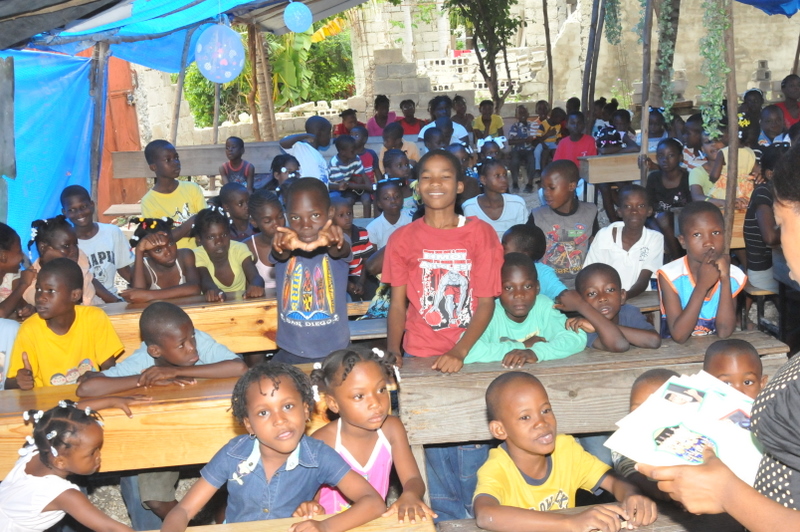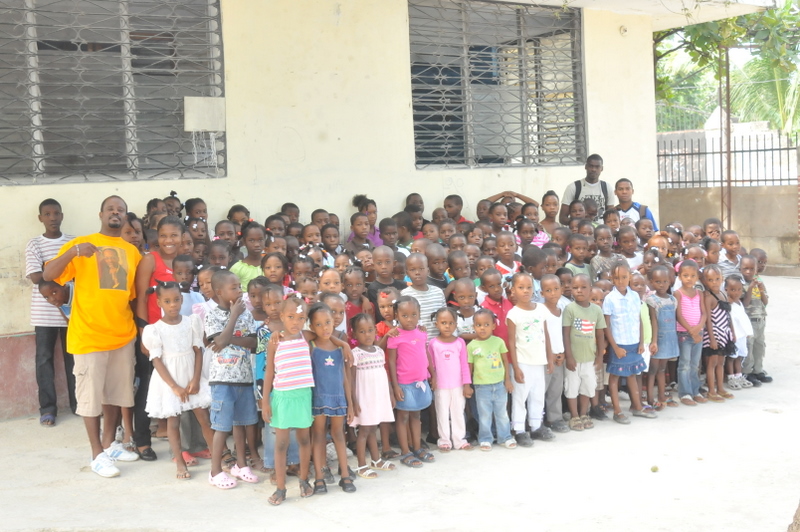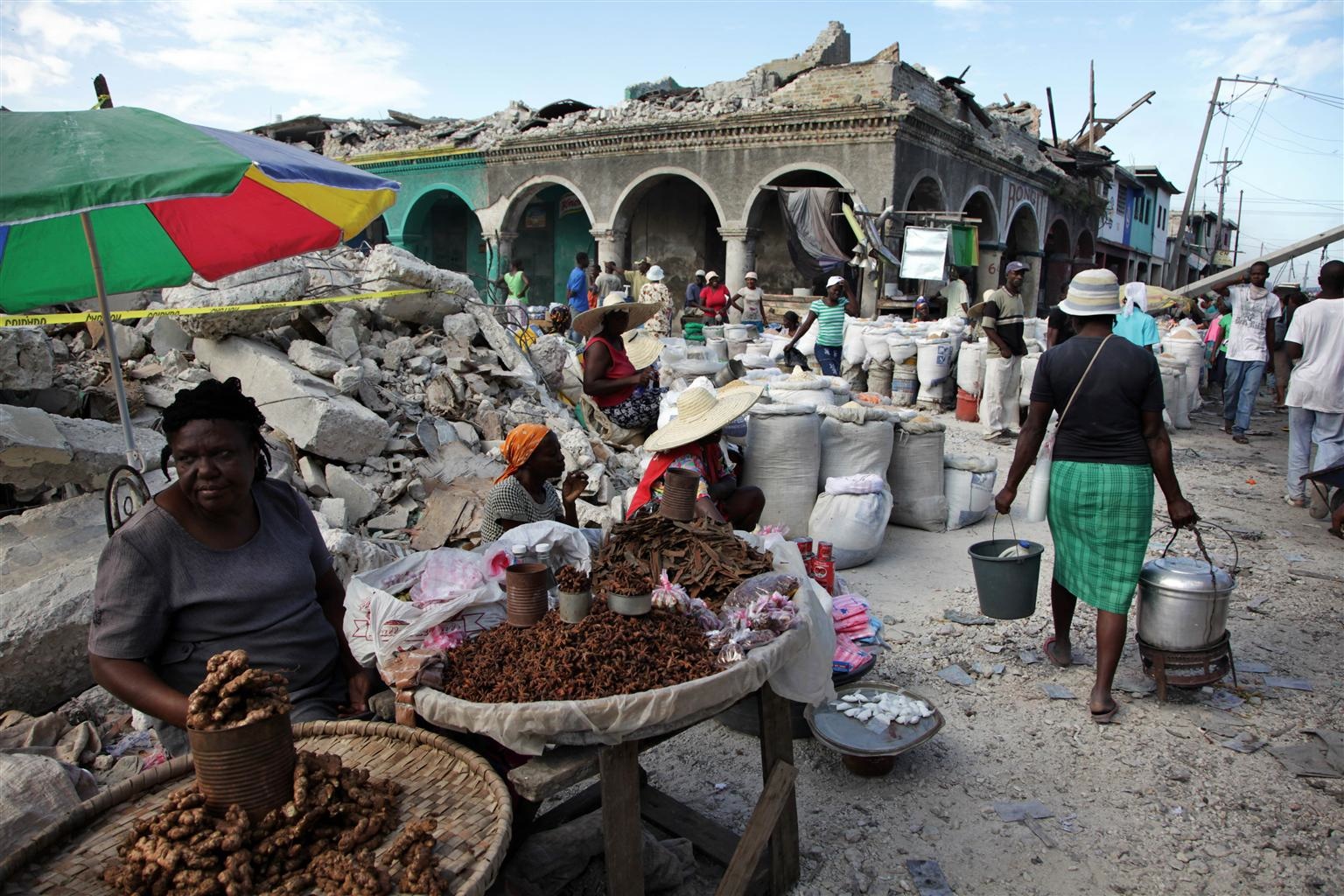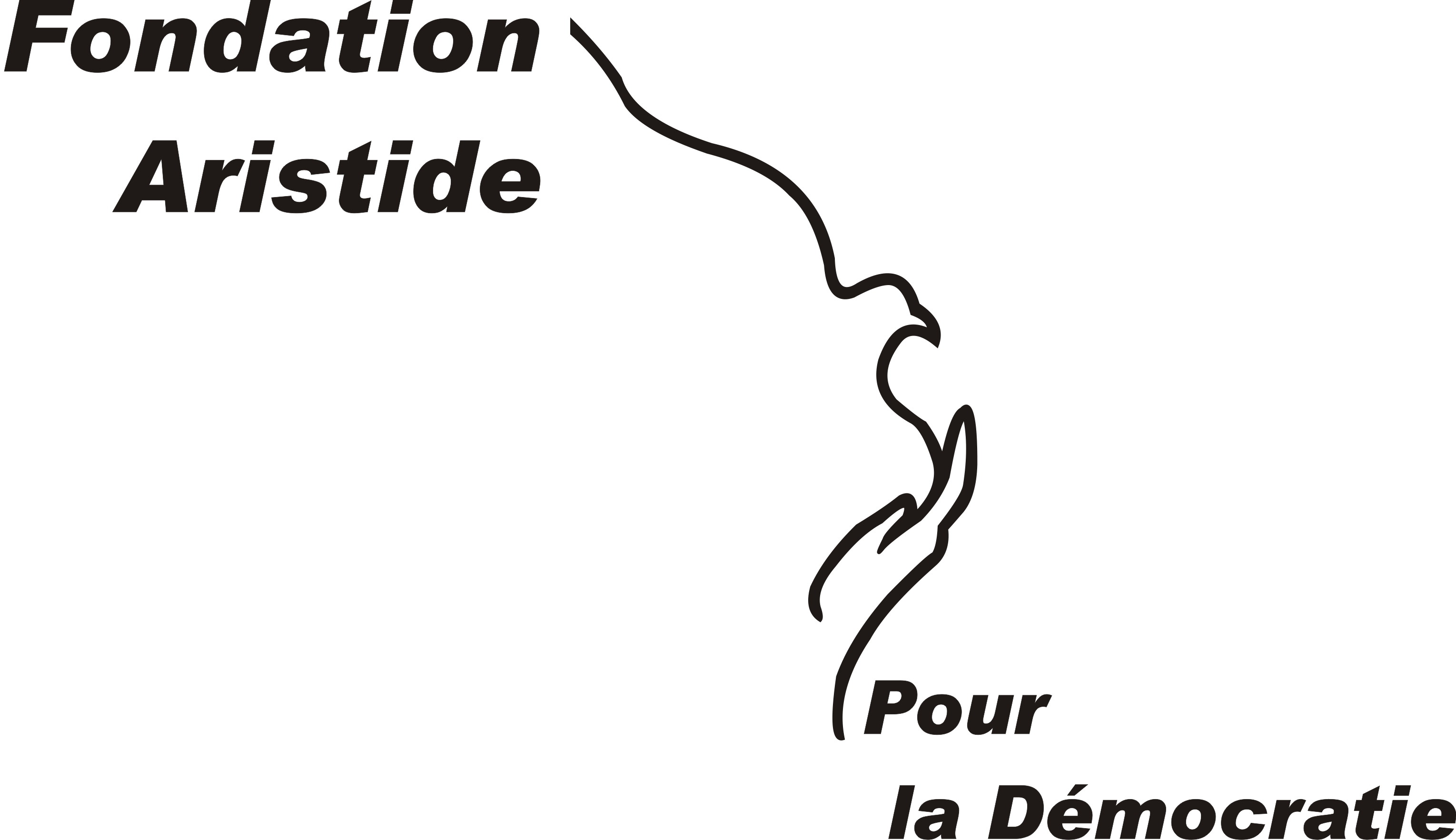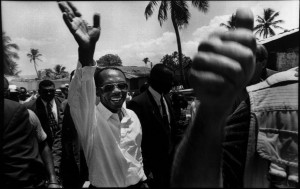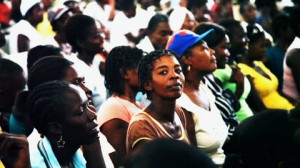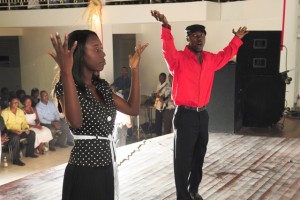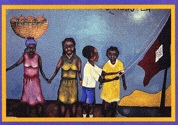Mobile Schools Continue in Nazon, Fontamara and Tapage
One month after the quake, the Aristide Foundation opened mobile schools in five refugee camps across Port-au-Prince. Throughout the spring these schools held open-air classrooms led by young high school and college graduates, offering a refuge for children who survived the quake. The schools gave the kids a safe place to go each day to relax, learn and spend time with supportive adults in the midst of the utter calamity they were living though. The mobiles schools served 1,200 children five days a week and employed 100 young Haitians during the first few critical months after the quake.
By summer as schools across the city began to slowly reopen, we ended the full time mobile school program. We had never intended the project to be permanent, and we did not have the funds to keep the schools open indefinitely.
However, in Nazon (central Port-au-Prince), Fontamara (Carrefour) and Tapage (La Plaine) the monitors along with the parents and members of these communities decided these schools were so important, and the collaboration was so successful, that they determined one way or another to keep the schools going on their own.
Together We Are Strong
Watch a New Video on the work of the Aristide Foundation since the
January, 2010 Earthquake Together We Are Strong
While the international press on Haiti has been abuzz with stories about Haiti’s upcoming Presidential elections, there is not much enthusiasm on the ground, where over a million and half people are still living in tents settlements across Port-au-Prince and the other areas hit hard by the quake.
Nearly every Saturday the Aristide Foundation holds a democratic debate were ordinary Haitians can gather and voice their views. These gatherings continue to draw participants from across the metropolitan area, the majority of whom are living under tents. What we hear from those coming to the AFD is disinterest in elections from which the largest political party in the country Famni Lavalas has been excluded, anger at the recovery process which has made almost no visible signs of progress in over 7 months and which offers no role for the majority of Haitians to participate, and a sustained call for the return of former President Jean-Bertrand Aristide and his family to his country.
For a full analysis of the political situation please see Haiti Elections: Unfair and Undemocratic by Ira Kurzban (Miami Herald September 8, 2010). To support Haitians call for the return of President Aristide add your name to this petition.
As we enter the eighth month since the quake the Foundation has begun to switch gears from the immediate relief efforts (mobile schools and mobile clinics) which we activated in response the catastrophe. We’ve begun to focus on more durable long-term projects including:
- An agriculture project on the grounds of the UniFA campus which will put formerly agricultural land near the city back into productive use, and which will provide children from the mobile schools we operated in the wake of the quake a chance to learn agricultural skills and raise food for their families.
- A micro-lending project to enable market women who lost their goods and businesses during the quake to restart their businesses and support their families.
- The reopening of UniFA, the University of the Aristide Foundation. The main classroom building, which sustained minor damage in the quake, has now been fully repaired. On September 1, 2010 computer science and Spanish language classes resumed inside the building. Over 300 young Haitians are now studying computer science on the campus. During the second week of September, 296 students how began their studies in the Spring of 2009 will complete their one-year Spanish language program. For the past several months, while the building was being repaired classes were held in open-air classrooms on campus, allowing students to continue their studies. For more on the reopening of UniFA please see the article which appeared in the Nouvelliste on Spetember 8, 2010 (French-language)
All the students currently studying at UniFA, and the thousands more who would like to join them, along with everyone connected to the Foundation, look forward to the day when UniFA can offer a full range of University-level programs to the children of the poor, including the reopening of the Faculty of Medicine which functioned from 2001-2004. With twenty-eight of thirty-two institutions of higher education in the country reportedly destroyed, the urgency of reopening and expanding the University to meet the incredible demand of Haiti’s youth could not be greater. We hope you will join us in finding the resources to making this dream a reality.
If you would like to support the work of the Aristide Foundation for Democracy tax-deductible donations can be made here:
Or mail checks to: Aristide Foundation, PO Box 490271, Key Biscayne, Florida 33149
All donations are tax deductible and will be acknowledged.
Soulaje Lespri Moun
by Laura Flynn
On May 20th I sat down with ten young recently trained lay mental health-workers in the Aristide Foundation for Democracy’s Soulaje Lespri Moun project, to hear how the new project was going. In April these young people received training from a group of social workers from the University of Michigan. (Read an Account of this work by Leah James on the Huffington Post)
For the past eight weeks they’ve have been conducting mental health sessions in two refugee camps in Port-au-Prince. On the day we met in the courtyard of the foundation one-by-one they raised a hand to offer some testimony about the work they were doing.
Most described an initially rough reception in the camps, where most people in Port-au-Prince are still living in conditions that can only be described as inhuman. People are hungry and understandably skeptical about a project that offers mere words. Over time the Mental Health Workers had made inroads, and some of the people who had initially been most skeptical were now regulars at the sessions, or regularly brought new people to participate. Several told stories about people who were drinking or doing drugs to escape the grief and the trauma, and who had came back to say they’d stopped, they would come to talk instead. Many, many people returned to tell them they slept better after participating in the sessions, and after doing the regular breathing and self-soothing exercises that are a key component to the trainings. Some participants reported headaches or body aches were eased, and many people described improved relations with their families.
One woman who came to a session had been estranged from her husband since the quake. Part of the instructions in the mental health workshop is to go home and do the relaxation exercises with your family each night. Despite the estrangement, this woman had taken the direction to heart and so sought out her husband in the camp were both were living. She taught him the breathing and relaxation exercises she had learned – this in turn led to a reconciliation, which was then celebrated by the whole camp.
